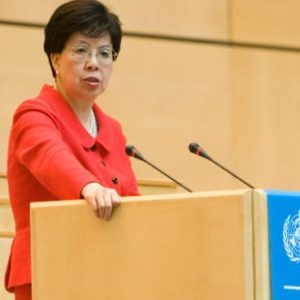Photo: Former WHO Director-General Dr. Margaret Chan addresses the 62nd World Health Assembly.
Credit: WHO/Cédric Vincensini
“I have never shied away from embracing [the] WHO’s position as the tobacco industry’s No. 1 enemy. I regard this as a badge of honor.” So declared Dr. Margaret Chan in 2014 as the Director-General of the World Health Organization (WHO) as she addressed delegates of the global tobacco treaty (formally known as Framework Convention on Tobacco Control).
During the decade she directed the WHO, Dr. Chan fully embraced her role as Big Tobacco’s nemesis, exposing and blocking attempts by the tobacco industry to undermine public health protections. As the new Director-General, Dr. Tedros Adhanom Ghebreyesus of Ethiopia, takes her place, we urge him to uphold Dr. Chan’s lifesaving legacy of standing up to Big Tobacco. And we also hope he will strengthen the WHO’s commitment to similarly challenge other industries that threaten public health, like Big Food.
Big Tobacco’s deadly tactics
Dr. Chan led the WHO as the tobacco industry waged a full-scale assault on public health protections. The global tobacco treaty, the world’s first public health and corporate accountability treaty, took effect in 2005, thanks to courageous government leaders, corporate accountability campaigners, and public health advocates around the world. The treaty enshrines into international law some of the most powerful measures for curbing the tobacco epidemic, including preventing the tobacco industry from having a seat at the policymaking table.
The treaty legally bars Big Tobacco from using its enormous political and economic power to water down, block, and delay lifesaving protections. So the tobacco industry turned to intimidation by litigation, bribery schemes, and predatory, youth-targeted internet marketing. “It is horrific to think that an industry known for its dirty tricks and dirty laundry could be allowed to trump what is clearly in the public’s best interest.” Dr. Chan said in 2012. “The enemy, the tobacco industry, has changed its face and its tactics. The wolf is no longer in sheep’s clothing, and its teeth are bared.”
Lifesaving results of the global tobacco treaty
But despite Big Tobacco’s dirty tricks, under Dr. Chan’s directorship of the WHO, governments around the world made steady progress in creating and implementing national public laws in line with the measures in the global tobacco treaty. From Colombia to the Philippines, Kenya to Australia , countries are implementing strong public health protections, including laws that prevent the tobacco industry from influencing public policy, laws that require tobacco products to be sold without branding and with graphic health warnings, and laws that bar all forms of tobacco advertising.
And as a result, fewer people around the world are becoming addicted to tobacco. The global tobacco treaty led to a 2.5 percent reduction in smoking rates during its first 10 years, saving an untold number of lives. Working shoulder to shoulder with champion government officials and organizations like ours, Dr. Chan played an important role in beginning to reverse the tobacco epidemic.
Protecting public health from profit-driven industries
We hope the incoming Director-General will follow Dr. Chan’s lead in proudly wearing the badge of Big Tobacco’s adversary. Together, we have made so much progress in curbing the tobacco epidemic, and Dr. Chan’s stalwart defense of public health protections from the influence of the industry played a key role.
But Dr. Chan also had her eye on other abusive industries. In a 2013 address, she said:
“It is not just Big Tobacco anymore. Public health must also contend with Big Food, Big Soda, and Big Alcohol. All of these industries fear regulation, and protect themselves by using the same tactics.
“Research has documented these tactics well. They include front groups, lobbies, promises of self-regulation, lawsuits, and industry-funded research that confuses the evidence and keeps the public in doubt.
“Tactics also include gifts, grants, and contributions to worthy causes that cast these industries as respectable corporate citizens in the eyes of politicians and the public. They include arguments that place the responsibility for harm to health on individuals, and portray government actions as interference in personal liberties and free choice.”
We also hope Dr. Tedros will follow Dr. Chan’s lead in exposing and challenging these tactics. As Dr. Chan pointed out, there are many threats to public health from industries that feel no compunction in bribing officials or misleading people in order to reap profit from their deadly products. Together, we can bring these industries in line as well.



